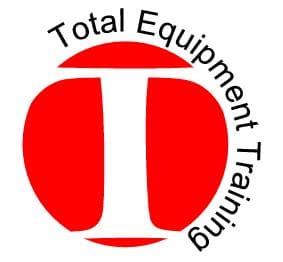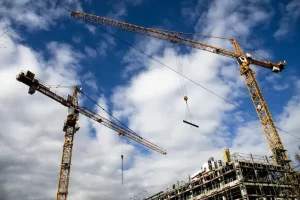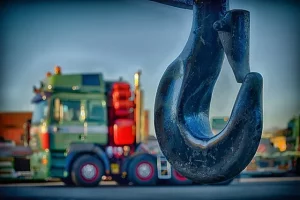Last updated: September 10, 2024. This article has been updated to reflect the most current information and trends.

Certified crane operators play a crucial role in construction, infrastructure projects, and various industries, operating cranes to safely lift and move heavy equipment and materials.
This comprehensive guide will walk you through everything you need to know about becoming a certified crane operator, including:
- What Does a Crane Operator Do?
- Essential Skills for Crane Operators
- Steps to Become a Certified Crane Operator
- Requirements for Crane Operator Certification
- Getting Mobile Crane Certified
- CCO Requirements For Crane Re-Certification
- Crane Operator Career Overview
- How Total Equipment Training Can Help
What Does a Crane Operator Do?
Crane operators handle specialized equipment to safely and efficiently move heavy materials. They are responsible for operating various types of cranes, including tower cranes and mobile cranes, each requiring specialized training. The basic tasks of a crane operator involve controlling complex levers, foot pedals, and wheels to lift and move heavy machinery and other materials.
In addition to operating the equipment, crane operators must ensure that all operations are conducted safely. Responsibilities include:
- Conducting daily pre-operation inspections
- Operating levers, foot pedals, and wheels to control the crane
- Collaborating with crew members, such as signal persons and riggers, for safe operations
- Following blueprints to move materials as needed
Essential Skills for Crane Operators
A successful crane operator must possess a combination of technical skills, safety knowledge, and the ability to work effectively in a team environment. While operating heavy machinery is a significant part of a crane operator’s job, it’s not the only skill required. To excel in this role, you’ll need a combination of technical abilities and soft skills:
-
Technical Skills:
- Mechanical Aptitude: Understanding crane mechanics and basic maintenance can improve efficiency and reduce downtime.
- Mathematical Skills: Calculating weight and load capacities is essential for safe operations.
- Hand-Eye Coordination: Precise control of the crane’s movements is crucial for preventing accidents.
- Manual Dexterity: Skillful use of levers and controls is necessary for operating large cranes.
-
Soft Skills:
- Problem-Solving: Identifying and addressing potential hazards is essential for safety.
- Communication: Effective communication with crew members, supervisors, and other stakeholders is vital.
- Teamwork: Collaborating with others to achieve project goals is essential.
- Punctuality: Arriving on time and meeting deadlines is crucial in construction projects.
- Attention to Detail: Ensuring accuracy and precision in all tasks is paramount.
By developing these skills, you’ll be well-prepared to meet the challenges and responsibilities of a crane operator.
Understanding Crane Categories and Industries
Crane operators can specialize in one or more crane types, such as Tower Cranes, Overhead Cranes, or Mobile Cranes. Employment opportunities are available across industries like construction, manufacturing, and logistics. Crane operators find employment in various industries, including:
- Construction
- Manufacturing
- Shipping and logistics
- Steel fabrication
- Railways
Steps to Become a Certified Crane Operator
Operating a crane requires a combination of skills, technical knowledge, and certification. Follow these steps to successfully become a certified crane operator:
1. Prepare for Your Crane Testing
Total Equipment Training offers crane study guides, and other resources such as free crane operator practice tests to help you prepare for your crane operator certification.
2. Complete Testing
Schedule and complete both the written and practical NCCCO exams. Total Equipment Training periodically offers in-person exams, or you can schedule exams at a testing center near you.
3. Update Your Resume
Enhance your resume by highlighting your certification, training, and relevant hands-on experience.
4. Apply for a Crane Operator Job
Utilize your network, apprenticeship programs, and popular job listing platforms to find crane operator job openings.
Ready to take the first steps towards being a local crane operator? Take a Free NCCCO Mobile Crane Certification Practice Test
Requirements for Crane Operator Certification
To qualify as a certified crane operator, you must meet these requirements:
- Age: At least 18 years old
- Education: High school diploma or GED
- Training: Complete a crane operator training program that prepares you for the NCCCO exams (National Commission for the Certification of Crane Operators exams).
- Certification: Pass both the written and practical NCCCO exams.
- On-the-Job Training: Obtain practical experience
Additional Considerations:
- State-Specific Requirements: While these are the general requirements, some states may have additional licensing or certification standards. Check for additional state-specific regulations
- Training Program Duration: Typically 4-8 weeks, depending on crane type
- NCCCO Certification: Widely recognized and often required for employment
Getting Mobile Crane Certified
Once you meet the basic requirements, the next step is to understand the detailed process of becoming a certified crane operator.
- Study for your NCCCO crane training program.
- Choose a mobile crane training session or take a remote crane training session at a work site.
- Pass two written CCO examinations.
- Core Exam: 90 multiple-choice questions in 90 minutes.One is a Core Exam and the second is a Specialty Exam that may be any of the following:
- Specialty Exam: 26 multiple-choice questions in 60 minutes. Choose from the following specialties:
- Lattice Boom Crawler Cranes (LBC)
- Lattice Boom Truck Cranes (LBT)
- Telescopic Boom Cranes -Swing Cab (TLL)
- Telescopic Boom Cranes – Fixed Cab (TSS)
- Pass the practical exam within one year of passing the written exams.
Total Equipment Training can send experienced trainers to your location to provide on-site training for your crane operator team, ensuring compliance with OSHA regulations.
CCO Crane Certification Policies
All CCO certification programs adhere to the following policies, outlined in their respective Candidate Handbooks:
- NCCCO Code of Ethics
- The code of ethics includes:
- Place safety and the welfare of others above all other considerations
- Protect and preserve the general public, property, and environment
- Ensure a work environment is free of bias as it regards to religion, ethnicity, gender, age national origin, and disability
- The code of ethics includes:
- Disciplinary Policy
- Substance Abuse Policy
- The substance abuse policy covers substances that will impair an operator’s judgement or ability to work including:
- Illegal drugs
- Alcohol
- Designer and look-alike drugs
- Any controlled substance
- The substance abuse policy covers substances that will impair an operator’s judgement or ability to work including:
- Testing Accommodations Policy
- Change of Address Policy
- The main purpose of the change of address requirement is to ensure you do not miss any updates from the NCCCO program.
- Appeals Policy and Procedures
- Information Release Policy
- Administrative Complaints Policy
- Non-administrative complaints can include:
- Program integrity for a violation of the code of ethics
- Administrative appeals if you have been the subject of an averse administrative decision
- General feedback
- Non-administrative complaints can include:
CCO Requirements For Crane Re-Certification
Initial Certification:
- Exams: Candidates must pass both the written Core Exam and one or more Specialty Exams, as well as the corresponding practical exam.
- Timeframe: All exams must be completed within 12 months of passing the first exam.
Certification Expiry and Multiple Designations:
- Certification Validity: Certifications expire five years from the date of issuance.
- Recertification: Operators must meet recertification requirements within the last 12 months of the certification period.
- Multiple Designations: All designations expire on the same date, regardless of when they were earned.
- Adding New Designations: Operators can add new designations without recertifying if they do so within the last 24 months of their current certification period.
- Extensions: Extensions are rarely granted and may be appealed to the Appeals Committee.
Recertification Requirements:
- Exams: Operators with at least 1,000 hours of crane-related experience during the certification period may only need to take the written recertification exam.
- Practical Exam: If required, the practical exam must be taken before certification expires.
- Lapse of Certification: If certification lapses, both the written and practical exams must be retaken.
Get Recertification Training for Your Heavy Equipment Company
Crane Operator Career Overview
How Much Does a Crane Operator Make?
Crane Operators are in demand; the market has been experiencing a rise in the demand for certified operators for some time now. The Bureau of Labor Statistics projected an 8% growth rate for crane operator jobs between 2014 and 2024, reflecting the increasing demand for skilled operators in construction and infrastructure projects.
According to Indeed, a certified crane operator earns an average of $25.32/hour in the US, with potential for higher earnings based on overtime, experience, location, and certifications. Some crane operator employers in the USA offer additional benefits such as 401(k) and insurance.
Various sources report a wide range of estimates for the salary of an operator in the USA while these estimations are heavily dependent on the location and the experience of the operator. A certified and experienced crane operator working in New York City, for example, could earn over $500,000, including overtime pay and benefits.
Benefits of a Crane Operator Career
- Competitive Salary and Benefits
- Stable Job Market with Growth Potential
- Opportunity to Work on Diverse Projects
- Sense of Accomplishment from Building Infrastructure
Are you already a crane operator and your company is requiring recertification training? Learn about our local crane operator group training!
How Long Does It Take to Become a Crane Operator?
Depending on the training program and the type of crane you wish to operate, it can take anywhere from a couple of months to a couple of years to become a crane operator. Most certification training courses last between 1-2 months. Nevertheless, most heavy equipment employers look to hire experienced operators which means you’ll need on-the-job training or an apprenticeship under a certified operator.
Ready to launch your career as a certified crane operator? Contact Total Equipment Training today to discuss your options and get started on your journey to a rewarding and fulfilling profession!
How Much Does It Cost to Get Certified as a Crane Operator?
Total Equipment Training offers accreditation through NCCCO. To become a certified operator, you will need to undergo crane operator training, as well as take, a written and practical exam. Training costs will vary based on the method of training. Employers are required to provide training for their operators. Total Equipment Training provides site-specific crane training and, if needed, certification.
Download Our Crane Operator Study Guide
Do You Need a CDL to Operate a Crane?
If your job requires that you drive the crane on the open road, you will need a CDL. It is possible to have one person drive a crane to a location and another person actually operate the crane. This is very counterproductive and wasteful, so we recommend employees operating cranes be licensed and trained in all roles.
Is a Crane Operator Career Safe and Rewarding?
Operating a crane can be a safe job when proper maintenance and safety procedures are followed. However, there are potential hazards such as electrical/power issues, overloading, and falling materials. These risks can be mitigated through careful planning, preparation, adequate training, and implementing safeguards.
A career as a crane operator might be a good fit if you:
- Enjoy working with heavy equipment
- Have good depth perception
- Enjoy working with people
- Enjoy traveling
- Enjoy working with your hands
This challenging yet fulfilling career offers stability and opportunities. If you’re ready to get started, take a free mobile crane operator practice test.
How Total Equipment Training Can Help
Total Equipment Training offers comprehensive crane operator training programs designed to equip you with the knowledge and skills you need to succeed.
We provide:
- Free Resources: Access our industry-leading blog articles for valuable insights and information. Take advantage of our free CCO practice tests to assess your knowledge and prepare for the NCCCO exams. Additionally, download our free inspection checklists to ensure compliance and maintain safety standards.
- NCCCO-Accredited Training: Our programs prepare you for the NCCCO certification exams.
- Flexible Training Options: Choose online crane training courses to fit your schedule.
- Experienced Instructors: Request that your company train your crane operators onsite, using your own heavy equipment!
Purchase the Mobile Crane General Knowledge Certification Manual





